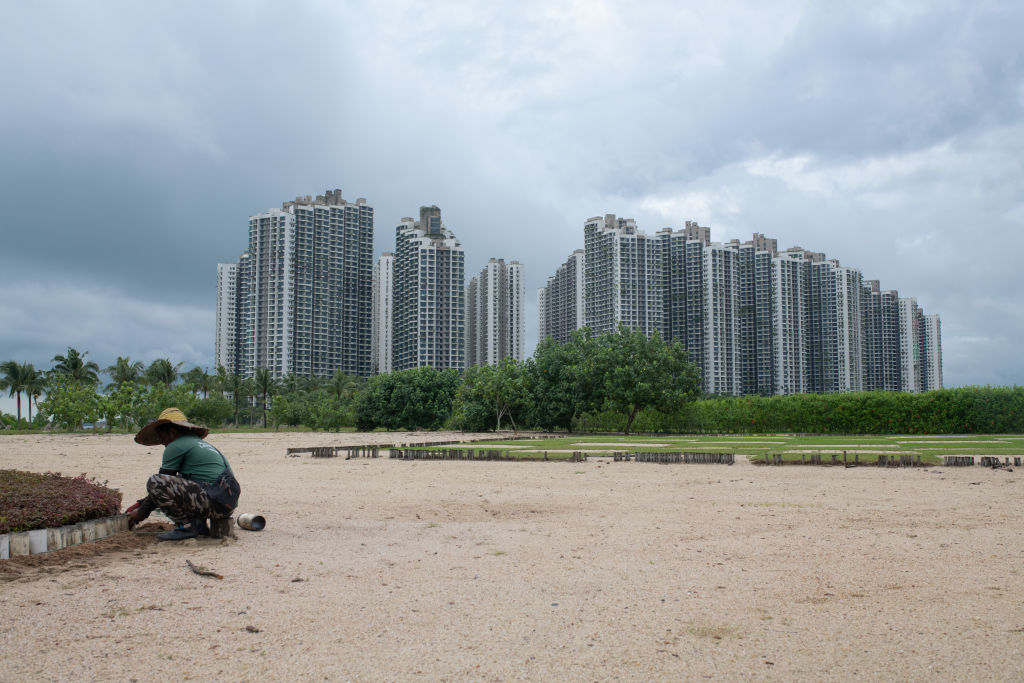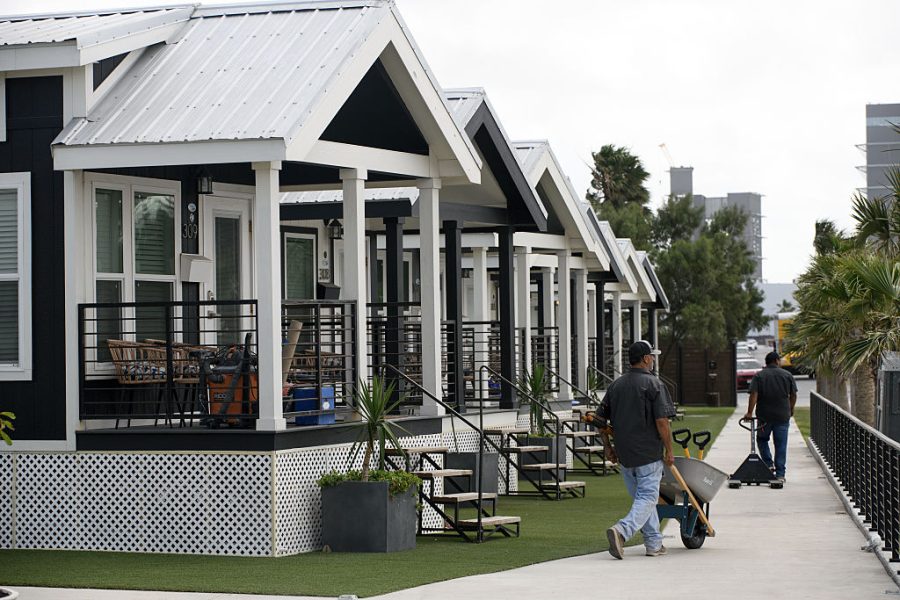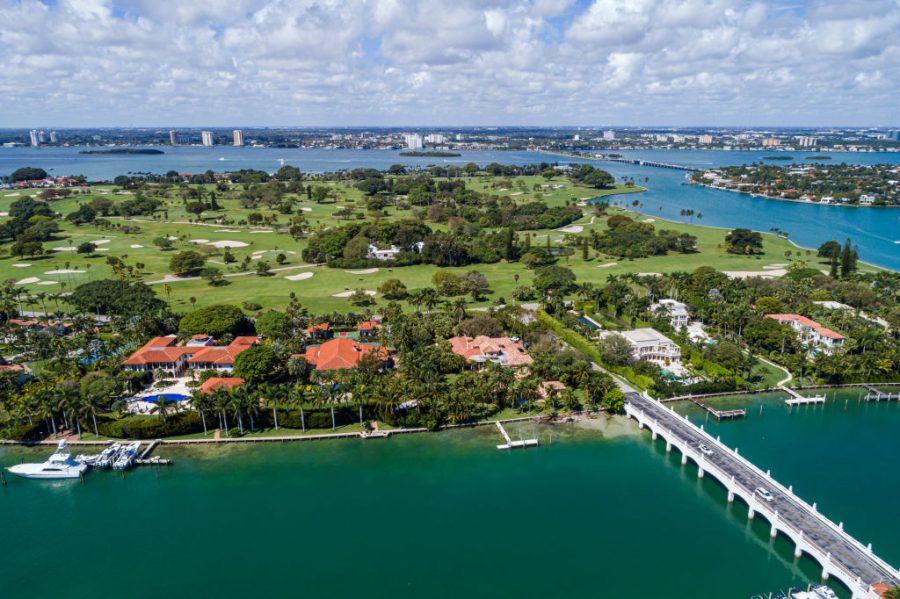You Aren’t Allowed in These Billionaire Towns
Welcome to the fully privatized city, where the ultrarich can do as they please — no whining from the rabble permitted.

Like Starbase and Indian Creek, Forest City, Malaysia, is highly securitized — policed by guards with the authority to kick people out at will and surrounded by electric fencing to guard its perimeter from undesirables. (Aparna Nori / Bloomberg via Getty Images)
At one of the first public meetings in the new city of Starbase, Texas, the first order of business was keeping the public out.
The city, near Brownsville on the Gulf of Mexico, voted to incorporate this May, forming a bizarre modern-day company town under the thrall of part-time resident Elon Musk. It’s made up of about five hundred people, spread across a few blocks of airstream trailers and ranch homes, almost all of whom are SpaceX workers or their families. The city serves as the launch site for the SpaceX Starship, and has been a passion project for Musk, especially since his dramatic falling out with the Trump administration this June.

Since incorporation, Starbase has operated as a uniquely undemocratic form of democracy. Most voting residents, including the mayor and two out of three members of the Board of Commissioners, work for Elon at-will and could easily be fired for going against his wishes. Many also reside in company-owned housing, where a firing leads to an eviction. This puts the entire town under intense coercive pressure to govern themselves in the interests of the company rather than the general public.
At the public meeting in late June, the Starbase government considered a proposal to build a set of gates around most of the town. These gates were a security measure, officials explained, and they would be used to bar anyone unaffiliated with Starbase from entering the town center. Some in the audience voiced opposition, but it didn’t matter. In the antidemocratic spirit of the town, the gates had been paid for and installed.
This is a striking move, effectively making a public municipality accessible only to those in good graces of Elon and SpaceX. Critical journalists, protesters, labor organizers, political canvassers, or anybody that Elon personally dislikes could all be excluded. Never mind that these streets had been maintained by state and county tax dollars for years — they have now been functionally privatized and annexed into Elon’s personal domain.
The incorporation and subsequent walling off of Starbase shows the increasingly ridiculous lengths billionaires are willing to go to in order to insulate themselves from the general public and local democracy. Elites have always used their private wealth and power to avoid interacting with the rabble, spending millions each year on personal security, or constructing elaborate gated compounds and bunkers. But more and more, billionaires are beginning to co-opt and use public power to defend their own security and privacy. It’s a brazen development for the billionaire class, who are seizing control of the levers of local government and using them to keep the public out.
Billionaire Bunker
A blueprint for the private, securitized billionaire town was drawn up in the 1930s, on a man-made island on the Biscayne Bay, just outside of Miami.
Indian Creek Village, nicknamed the “billionaire bunker,” is a part-time home to uber-wealthy elites like Amazon CEO Jeff Bezos, Jared Kushner and Ivanka Trump, Tom Brady, and billionaires Carl Icahn and Eddie Lampert. It stands out from other elite enclaves in that, since its incorporation in 1939, it has also been governed by this same group of billionaire homeowners, who draft its laws and shape its budget.

As in Starbase, a main function of public power here is excluding the public. The uber-wealthy community is separated from the only regular-wealthy city of Surfside by a heavily defended bridge. Nobody is allowed to cross this bridge unless they have the permission of one of the eighty or so residents, or a $500,000 membership to the island’s private golf club.
Security has always been a top priority for the Indian Creek billionaires, but in recent years, as the island has gotten even wealthier, it’s become an obsession. The town charters its own heavily funded police force who patrol the island in speedboats 24/7, basically acting as private security for the island’s residents. Their police spending increases every year, so much so that it now makes up 75 percent of their annual budget. In 2022, they installed an elaborate Israeli radar detection system around the island’s perimeter, and have begun aggressively ticketing boats that pass too close to their shores.
Indian Creek exists in a strange quasi-public space, where it can still cash in on the perks of being an incorporated town while behaving like a gated community. Though they are able to hoard most of their own property tax dollars for personal use, they draw on government grants and municipal bonds to repair their roads. Though most Florida taxpayers are not allowed to step foot on the bridge leading to the island, they have been asked to spend millions of dollars restoring it. Even Indian Creek’s radar detection system benefits from public funding.
In the billionaire town, guys like Jeff Bezos are able to have their cake and eat it too — they get the benefits of their status as an incorporated town while avoiding traditional obligations to the broader public.
Privatizing Cities
Among the tech elite, establishing your own city is becoming the hot new trend. Musk has his project in Starbase, and another city in the works outside of Austin. The concept of the “Network State” — described by originator and tech venture capitalist Balaji Srinivasan as “a highly aligned online community with a capacity for collective action that crowdfunds territory around the world and eventually gains diplomatic recognition from pre-existing states” — has been gaining prominence in tech circles. The movement has led to the creation of Prospera, a libertarian mecca in Honduras sponsored by venture capitalists like Sam Altman, Marc Andreessen, and Peter Thiel, where corporations can regulate themselves and citizenship can be purchased for $1,300 a year.
Donald Trump has promoted the idea of “freedom cities,” a vague structure that would allow new cities to operate with less regulation. The goal is to circumvent traditional democratic structures that they view as too cumbersome for the dynamic innovation and prosperity they are sure to deliver.
A slew of new semiprivate cities have been popping up, mainly in developing nations. These places tend to be built by the rich for the rich, melding public and private into highly secured gated communities, with little room for public space or local democracy. While these projects can promise sweeping visions of interplanetary travel, lifesaving medicine and sustainable development — in practice they tend to be much less grand.
In a 2023 article, researchers Sarah Moser and Nufar Avni examined the development of one such city, a recently established Malaysian private municipality called Forest City. While developers claim that it is an “eco-city” and a model for sustainability, it has been entirely designed for car infrastructure and threatens the seagrass ecosystem it sits on top of. Like Starbase and Indian Creek, the city is highly securitized — policed by guards with the authority to kick people out at will and surrounded by electric fencing to guard its perimeter from undesirables.
“Thus far, the limited scholarship on new private cities seems to suggest that they fail on every justice front,” write Moser and Avni. “Democracy, participation, inclusion, social and environmental sustainability, and diversity are simply absent from their planning and execution.”
With the wealth and influence of billionaires continuing to rise, these semiprivate cities seem poised to proliferate in the coming years. Looking at how the elites govern these public–private enclaves reveals what their priorities truly are: maintaining a clear dividing line between themselves and the working class, defended by high walls, radar detection systems, and a well-funded, heavily armed police force.